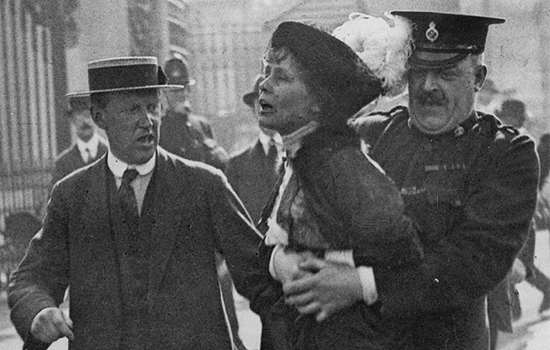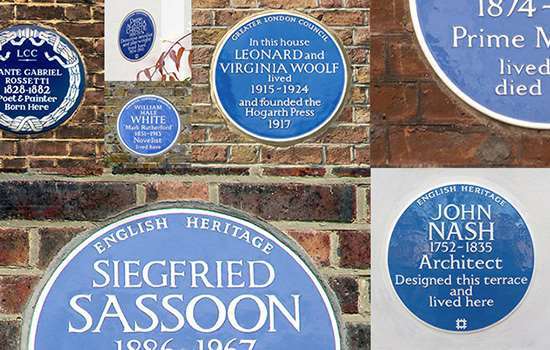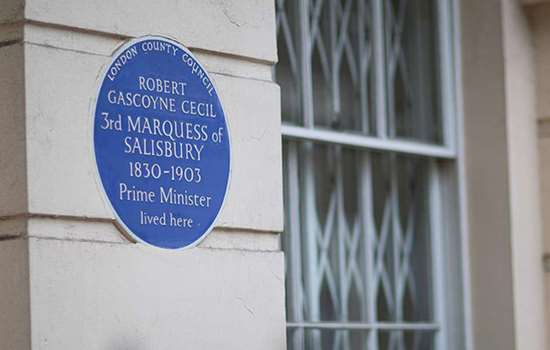Ransome, Arthur (1884–1967)
Plaque erected in 2021 by English Heritage at 1 Gunter Grove, Chelsea, London, SW10 0UJ, Royal Borough of Kensington and Chelsea
All images © English Heritage
Profession
Author and journalist
Category
Journalism and Publishing, Literature
Inscription
ARTHUR RANSOME 1884–1967 Author of Swallows and Amazons lived here 1904–1905
Material
Ceramic
Arthur Ransome was one of the 20th century’s most successful and influential children’s authors, who is best known for his immensely popular Swallows and Amazons series of novels. A blue plaque commemorates the Chelsea flat where he lived in 1904–5, which was the backdrop to the formation of both his literary persona and many lasting friendships.
Arthur Michell Ransome was born in Headingly, Leeds, the eldest of four children of Cyril Ransome, a professor of history, and his wife, Edith. By his own admission, he was ‘a cheerful, small boy of action rather than of letters’. He thrived during family holidays at Coniston Water in the English Lake District rather than at school.
After two terms as a chemistry student at Yorkshire College in Leeds, he decided to pursue his ambition to write, and at the age of 17 headed for London. There he worked in menial publishing jobs before starting to eke out a living by writing articles and stories for literary magazines.
So began a bohemian lifestyle in London as Ransome transformed himself from struggling hack writer into a successful literary figure. His conviviality and passion for literature attracted a growing circle of like-minded literary friends, actors and artists.
Gunter Grove
While in London Ransome lived briefly at many different addresses but he had a deep and romanticised attachment to Chelsea, expressed in Bohemia in London (1907). Between spring 1904 and autumn 1905 he occupied the front room on the raised ground floor of 1 Gunter Grove, a three-storey 1850s end of terrace. As he later recorded, it was a marked improvement on his previous bedsit over a grocer’s shop, not least because breakfast was included in the rent. Nonetheless, he was always hungry.
Ransome’s stay at 1 Gunter Grove saw him publish his first serious book, a collection of essays called The Souls of the Streets, in August 1904. In his autobiography he recalled how his trembling hands opened the parcel containing
half a dozen copies of my first book, bound in pale mottled paper boards … I can remember patting its silly little cover much as I have patted a boat when she and I have been alone at sea and struggling along in unkindly weather.
The year 1904 also saw him forge a close friendship with the writer and artist WG Collingwood and his family, who lived close by. It was with them that he renewed and deepened his love of the Lake District, retreating there as often as possible.
He also shared his lodgings with Edward Thomas, the poet. Thomas stayed for three weeks in autumn 1904, waking the landlord in the rooms below with his loud renditions of Welsh songs in the early hours.
Russia
In March 1909 Ransome married Ivy Constance Walker, and their daughter, Tabitha, was born in May 1910; but the marriage was unhappy. A difficult period followed when Ransome’s biography of Oscar Wilde, published in 1912, led Lord Alfred Douglas to bring a libel suit against him. Ransome won the case in 1913. But to distance himself from the experience, as well as his unhappy marriage, he decided to visit Russia to research Russian folklore.
After several visits to Russia Ransome eventually settled there in 1915, as special correspondent of the Daily News. Over the next four years he covered the war on the Eastern Front and reported on the political and military drama as imperial Russia crumbled and was replaced by Soviet rule. He enjoyed unrivalled access to the Bolshevik leaders, and fell in love with Trotsky’s personal secretary, Evgenia Petrovna Shelepina. Though sympathetic to the Bolsheviks, he was recruited by MI6 as a secret agent, and sent regular reports back to the secret intelligence service, who were working to thwart revolution in Russia.
Swallows and Amazons
After the war Ransome and Evgenia lived in Estonia, where they married in 1924 after Ransome’s divorce from Ivy. In 1925 they settled close to Windermere. Ransome continued to write for The Manchester Guardian, who had employed him as foreign correspondent since 1919, but fishing and sailing were now his main preoccupations.
In 1929 Ransome began to write Swallows and Amazons. Featuring the adventures of children on and around the lakes, the novel was inspired by a summer spent teaching the four Altounyan children (grandchildren of the Collingwoods) to sail their dinghy Swallow on Coniston Water. It was published in 1930 to favourable reviews, which led Ransome to devote himself to writing further books in the series. Publication of the third novel, Peter Duck (1932), saw sales take off, and all the later books in the series were bestsellers.
The Swallows and Amazons novels – 12 in all – enjoy a worldwide reputation, and have been translated into over 18 different languages. Film and television adaptations, most recently in 2016, have kept Ransome’s name in the public eye.
Ransome died on 3 June 1967 and was buried in the churchyard at Rusland, halfway between Windermere and Coniston Water.


